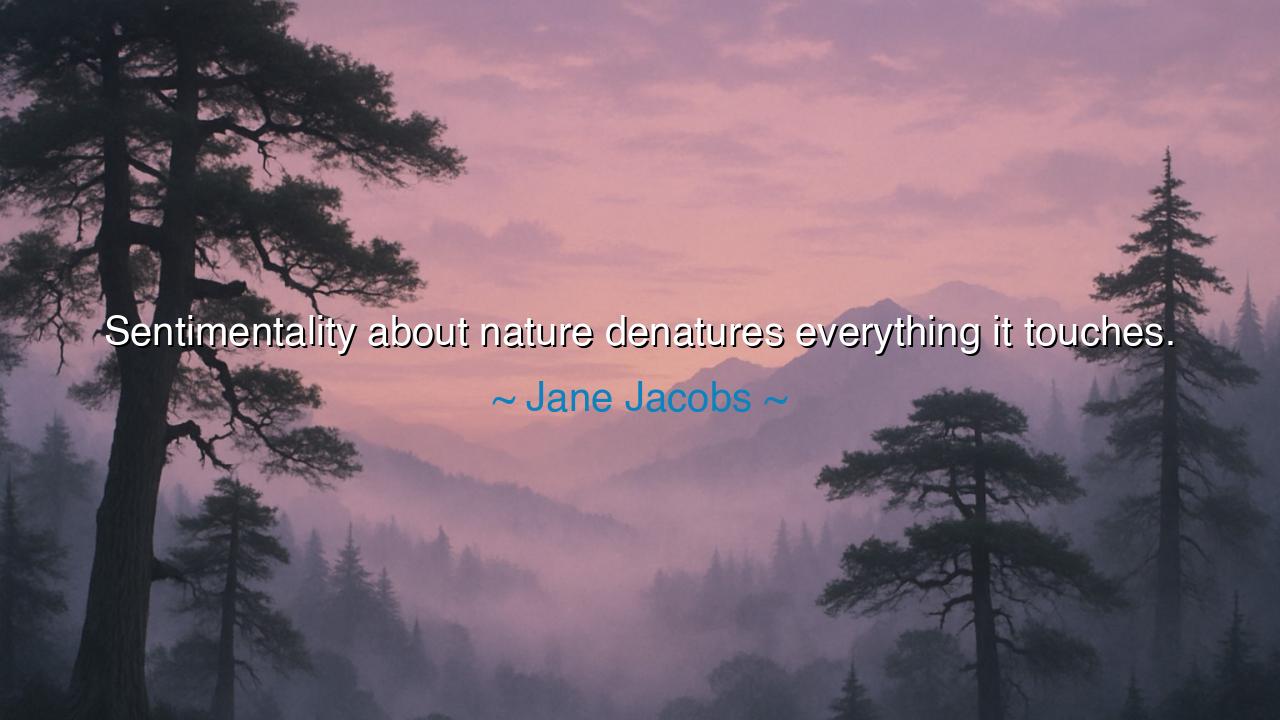
Sentimentality about nature denatures everything it touches.






Jane Jacobs, the great defender of cities and sharp observer of human environments, once warned: “Sentimentality about nature denatures everything it touches.” These words are like a sword, cutting through the illusions of false affection. She teaches us that to love nature is not to drape it with fantasies, nor to reduce it to decoration, but to see it for what it truly is: living, dynamic, and real. Sentimentality is not true reverence; it is indulgence. And when indulgence replaces respect, it distorts and weakens both our vision and our actions.
The origin of this saying lies in Jacobs’ lifelong fight against shallow planning and careless urban design. In her great work The Death and Life of Great American Cities, she challenged those who imposed artificial order upon the living fabric of communities. Likewise, when she turned her gaze upon nature, she condemned those who romanticized it rather than engaging with its real complexity. To sentimentalize nature, to treat it as a postcard or an ornament, is to strip it of its true vitality. In essence, sentimentality denatures—it reduces the authentic to a lifeless imitation.
History offers us sobering examples of this truth. Consider the 19th-century Romantic ideal of wilderness, celebrated in paintings and poetry, yet leading often to the destruction of actual landscapes. In the United States, vast lands were cleared, rivers dammed, and forests consumed, all while art and literature proclaimed devotion to the “beauty of nature.” The sentimentality masked the destruction, and what was left behind was not living wilderness but tamed parks and cultivated gardens. Beauty was praised, but reality was diminished.
The emotional force of Jacobs’ words lies in her demand for honesty. To love nature truly is to see its harshness as well as its gentleness, its cycles of death as well as its moments of bloom. It is to recognize that nature is not fragile ornament but resilient force. To sentimentalize it is to deny this complexity, to flatten its richness into something comfortable and shallow. In doing so, we lose the ability to protect it, for we no longer see what it truly requires of us.
There is also a moral danger in sentimentality. For if we imagine ourselves lovers of nature while only indulging in fantasies of it, we may excuse ourselves from action. We may enjoy the idea of the forest, yet not rise to defend the actual forest. We may praise the beauty of rivers, yet remain silent as rivers are poisoned. Sentimentality becomes a substitute for responsibility, and in this substitution, nature is betrayed.
The lesson for us, then, is to cultivate truthful reverence. To engage with nature as it is—not as a dream, but as reality. This means studying it, walking in it, understanding its cycles, respecting its dangers as well as its gifts. It means opposing those who would destroy it, not with soft words alone, but with firm action rooted in clear vision. True love of nature is active, informed, and courageous, not sentimental or indulgent.
Practically, this calls us to live with attention and responsibility. Plant trees not for their image, but for their role in sustaining life. Defend wetlands not because they look pretty, but because they cleanse water and shelter countless species. Teach children not only to admire flowers but also to understand soil, insects, and decay. For in these truths lies the fullness of nature, and in that fullness lies wisdom.
Thus, Jane Jacobs’ words endure as a sharp reminder: sentimentality is the enemy of truth. To sentimentalize nature is to strip it of its power, to betray it with shallow affection. But to see it clearly, to love it as it is—harsh, beautiful, complex, and alive—that is the path of reverence. Carry this wisdom forward, O seeker, and let your love of nature be not weak sentiment, but strong truth, lived in action and respect.






AAdministratorAdministrator
Welcome, honored guests. Please leave a comment, we will respond soon